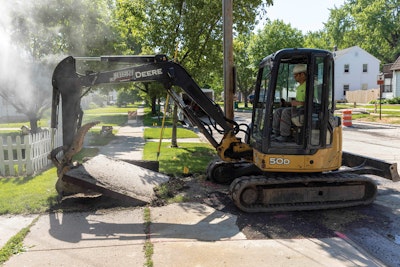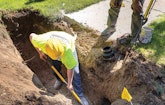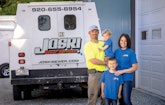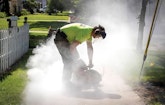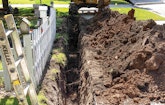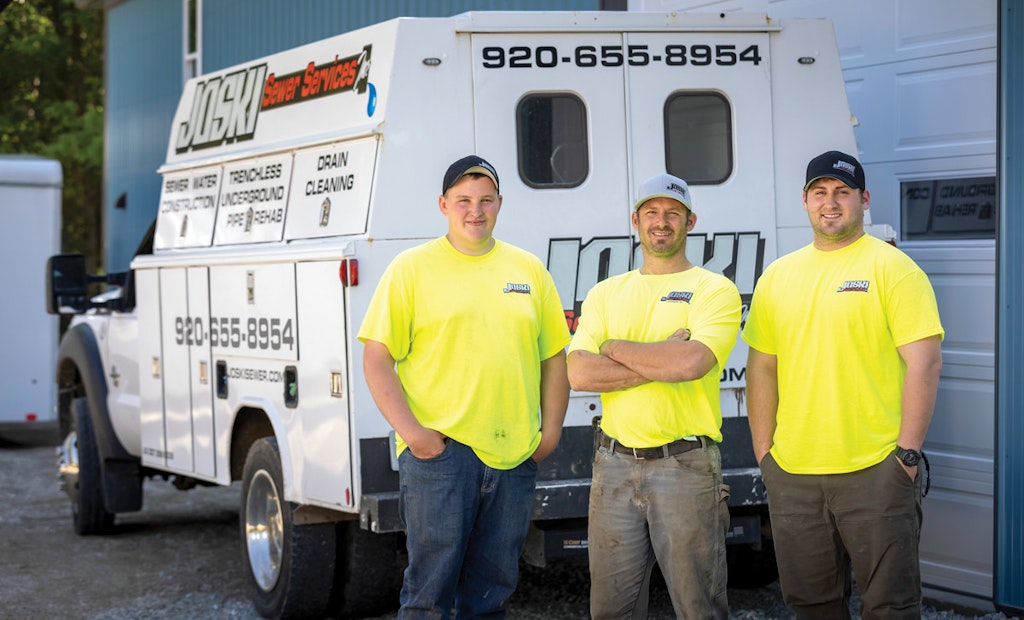
Joski Sewer Services owner Mark Joski (center) with his crew, Masen Block (left) and Matt Aqatone at the company’s new shop in New Franken, Wisconsin.
Interested in Cleaning?
Get Cleaning articles, news and videos right in your inbox! Sign up now.
Cleaning + Get AlertsFrom the beginning, Mark Joski wanted his company to be a full-service business. He opened Joski Sewer Services in 2014 solely as a drain cleaner, but that was only “my foot in the door,” Joski says. He was already planning to expand.
Today, his company offers numerous and varied solutions with no one particular service dominating the work. “It’s pretty balanced. I do a lot of things. A sewer cleaning will lead to a pipe bursting when a pipe is found in need of repair — it all works together. I’m a one-stop shop and that was my goal from day one. It was planned.”
He works in and around Green Bay, Wisconsin, answering service calls for a 50-square-mile area in adjacent counties. He and three employees clean drains in Green Bay mostly, but the full range of his services is called upon in outlying areas, including bursting pipes for smaller municipalities.
His customer base reflects the diversity of his services. He cleans and inspects older lines, lays new sewer pipe and laterals, restores existing pipe systems by coating, lining or bursting them, excavates holes or grades driveways. These services attract homeowners and business owners, land developers and municipal public works departments.
Consequently, Joski keeps busy. He has about a 50-50 mix of residential and nonresidential customers in any given month. “It all has been working out pretty well.”
Setting up shop
The 38-year-old business owner began working in the industry in 1999 as an employee of a Wisconsin sewer and water contractor. He traveled around the state completing three- or four-day projects, staying overnight in local motels until a task was completed. He eventually decided life on the road was not the career path for him.
So, he gave up that job and got out of the industry altogether, becoming a FedEx contractor. Four years into that work, Joski concluded he was experiencing little enjoyment from delivering packages. Furthermore, he longed to get back into the sewer and drain industry.
A resident of Denmark, a small town about 15 miles southwest of Green Bay, he opened Joski Sewer Services at his home. Within a year of launching the business, Joski began to diversify. He first added excavation to his sewer and drain portfolio. He rented excavation equipment as needed — a skid-steer, a mini-excavator — until he began to question the economics of renting the machines. “I decided if I was going to use a piece of equipment more than two or three times a year, it didn’t pay to rent it.”
He opened a shop space in Green Bay because the city would be a foundation of his business. He also recognized that potential customers using Google would be more apt to find and click on “Joski Sewer Services” if it showed a Green Bay office.
Two years ago, he got into what he has found to be satisfying work: trenchless pipe repair. He began with epoxy coating, refurbishing cast iron pipe. The process involves a camera inspection to determine if a scaly pipe is a good candidate for coating, then removal of the worst of the scaling using Picote chain knocker descalers at the end of a mechanical router.
A Picote pump then infuses the interior of the pipe with a thick, two-part epoxy that is mixed as it’s pumped. The epoxy is mechanically brushed onto the surrounding pipe — beginning at the far end of a project — and then heat is introduced to dry the coat. The process is repeated twice more to create a hardened three-coat lining of the pipe.
“Generally, this is what we use inside buildings when a cast iron pipe is under a finished floor,” Joski says. In other applications, Joski sometimes uses a Picote CIP inverted lining product, which he began offering customers after experiencing success with the epoxy fix.
Most recently, the company is offering yet another trenchless solution: pipe bursting. Joski opts for the HammerHead PortaBurst system, which can ram new pipe into old lines 2 inches to 6 inches in diameter. The company also performs trenchless spot repairs.
Joski believes all of the trenchless systems will continue to attract customers. “It’s noninvasive and saves customers a lot of money.” The amount can vary, Joski says. “Every situation is different. Coating generally is comparable in cost to lining. Bursting pipe is a little cheaper and a little faster process, but some excavation is required for the equipment.”
He always gives a customer the choice of how to proceed. “What I like to do is give them the price for doing it the old-fashioned way, digging up a pipe and replacing it. If it’s in a building, that includes cutting up the floor and busting out the concrete. Coating and lining always is cheaper because my restoration costs are zero.”
A solution to a totally different problem also keeps Joski Sewer Services busy — creating mini storm systems. It’s a response to localized heavy rainfall in recent years, possibly a change in the area’s climate. Flooding has been more common as a consequence and homeowners are finding their properties threatened by the downpours.
“They can’t get the water away from the house and the excess water is creating basement wall problems,” Joski says. Downspouts on homes commonly emptied the accumulated rainfall from roofs into the yard itself, or into shallow-buried corrugated black pipe that acted as a drain tile. “A lot of those systems are older. The stuff was cheap and fast to put in and frost has beaten it up.” Water was pooling near the houses instead of draining away. Joski crews are laying PVC pipe from the base of downspouts to an outlying area to carry away the water. “We’ve had a ton of mini storm sewer jobs.”
Gearing up
Joski Sewer Services has a fuller equipment yard than some competitors. The equipment includes the various Picote and Hammerhead machines for the trenchless fixes, an Insight Vision modular camera system, a small Milwaukee cable machine and an old Regis cable machine, which mostly has been supplanted by a Picote Maxi Miller.
The company also locates lines for customers, including other contractors, and has Subsite and RIDGID tracers for that work. Yet Joski mostly just locates lines for his own projects now. “I used to do a lot more of it, but unfortunately the equipment is really expensive, and customers don’t want to pay what it really costs to do a job.”
He also owns various pieces of excavation equipment, more pieces than a typical sewer and drain cleaning shop has on hand. They include a John Deere 50 mini-excavator that weighs less than five tons and is powered by a 39 hp engine as well as a Komatsu 138LC, a 17-ton, tight-tailed excavator with a 97 hp engine. Also in the yard is a Ditch Witch FX30 trailered hydrovac unit for uncovering lines and a CASE skid-steer for backfilling.
Joski owns so much excavation equipment — including two dump trucks and various excavator attachments — because he also undertakes general earth-moving work. “Mostly in summer months,” Joski says. “Right now, I’m just doing sewer and drain work.
But even in the summer, I don’t do a ton of other kinds of excavation work, like driveways and foundations, because there’s more money in putting pipe in the ground.”
Yet his reputation as a capable dirt-mover still brings him work. “I do have friends in the excavation business that I work with. Sometimes I’ll go to a job site and do the pipe work and then sub out some excavating while I’m there.” His sewer and drain employees are cross-trained to operate the machinery.
Joski’s jetter is a one of a kind. He had a pretty good idea what he wanted in a hydrojetter because of his experience working with a sewer contractor as well as from being around extended family members who are in business laying large-diameter sewer pipe. So, he built his own.
“I put it together myself, a trailer with a jetter on a skid. I built my own reels,” he says. It has 225 gallons of onboard water and produces 10 gpm. “You can buy the units all assembled but I saved a lot of money.” The unit is contained in an insulated trailer box so he can “pull it around in the winter without worrying about anything freezing.”
Because the jetter has an integrated heater unit, Joski can pressure-feed hot water into clogged lines. That helps free up frozen lines, of course, but he says it also is key to clearing restaurant lines. “You turn that boiler up to 220 degrees and that hot water really melts the grease.”
Joski looks ahead and sees further expansion of Joski Sewer Services. While he has no intention of introducing new services, expansion of current ones is likely and will partly depend on the labor force situation.
“I want to grow a little bit bigger, grow everything a little bit more,” he says. “Keep what I’m doing but growing it some more, after I find more help. Help’s hard to find today. I’m really fussy about who works for me. The work has to be spot-on because my name is on the company and finding that kind of help is hard to do.”
